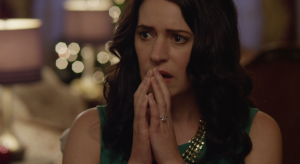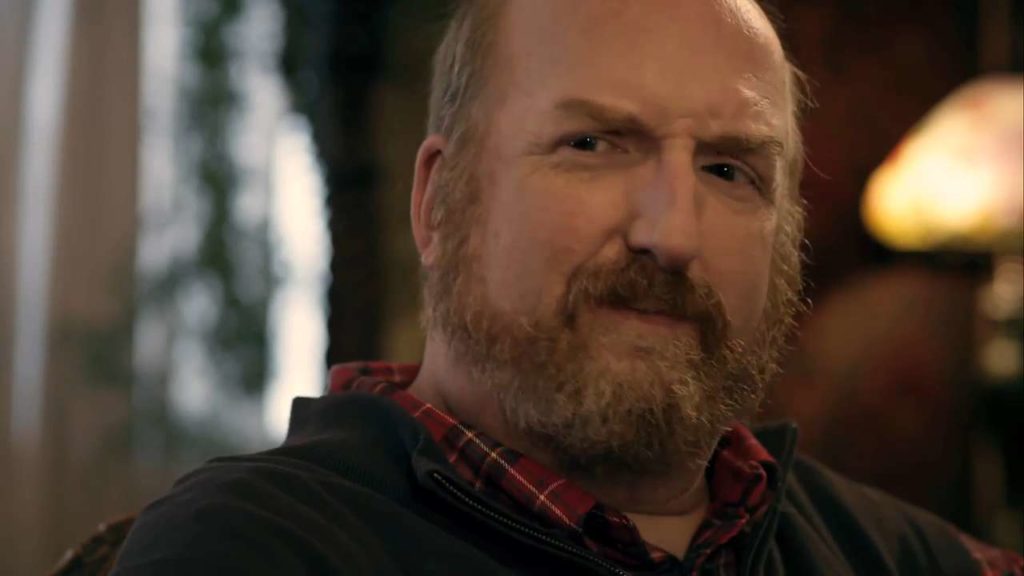Crass holiday films can work when done correctly. National Lampoon’s “Christmas Vacation” is an example, a film that draws its laughs from its chaotic presentation. “Bad Santa” is another one: a film whose anti-hero, Willie T. Soke, draws sympathy from a place of loneliness and hopeless alcoholism. 2015’s “Uncle Nick,” starring stand-up comic Brian Posehn, wants to be both films, but unfortunately fails miserably. The movie is crass, which is a prerequisite. It evens a heart. But it’s jumbled together so haphazardly, and with a constant, distracting narration, that it gets lost amidst the noise.
The film’s basic premise is that Uncle Nick (Posehn), is invited to his brother’s new wife’s house for Christmas dinner, and shenanigans ensue. Nick, who runs a failing landscaping business, is revealed early to us as a loser of epic proportions. He does things like lounge around in his underwear smoking cigarettes or stereotyping his Puerto Rican employee as Mexican. He bums a ride to the holiday party from said employee, stopping to get some gifts for a later game of exchanging presents (blue tape and some blank VHS tapes), and, of course, a plethora of liquor.
“Uncle Nick” is Directed by Chris Kasick, most famous for penning 500 or so episodes of T.V.’s “Attack of the Show!” and it shows. “Nick” is unfocused, at its base, and can’t really decide what kind of film it wants to be. It’s raucous, but doesn’t really throw its raunchiness in your face, is comedic but doesn’t rest its success on comedy. It’s as if it wanted to be all things – a comedy, an endearing drama, a gross-out gag fest, but Kasick and writer Mike Demski just couldn’t make a decision.

The acting in the film is not terribly bad, especially Uncle Nick’s family, who are comprised of Hollywood B-listers. As Nick’s brother Cody, an arrogant cretin, Beau Ballinger does a fairly good job making us hate him. And his wife Sophie, who is played earnestly by Paget Brewster, is sweet – in her own way – and draws sympathy when her character ran the risk of merely sticking to the convention of the rich housewife. The cast is rounded out by Melia Renee, who plays Sophie’s sexually feisty daughter Valerie, and her son, Marcus, an online-addicted adolescent who is played by Jacob Houston. All are pleasing to watch, and there are no real acting missteps here.
As Nick, Posehn is basically playing himself, utilizing gross-out humor to push the movie along. I’ve seen Posehn live before, in Montreal as part of their Just For Laughs festival, but thankfully he’s not pushing stand-up here, but trying to garner sympathy for his character yet still being funny along the way. The problem is that the film isn’t really that funny. You’ll laugh a couple of times, but overall “Uncle Nick” is, at the core, just a dysfunctional family holiday film that lacks much substance.
Nick basically drinks and smokes his way through this film – but, opposite of what is promised in several flashbacks – never becomes that quintessential party-ruining drunk. He provides a look into the lives of these people, and it’s not really pleasant, what we see.
 The film does one thing right in its setting, placing the film in Cleveland Ohio rather than hallmark cities such as New York or Chicago, which gives it its own edge. But rather than explore the city, the film runs a tiring narration throughout of a disaster of a Cleveland Indians baseball game that went horribly awry on a night they basically gave away beer. Nudity, fights, and player injuries are chronicled in black and white, breaking up each segment of the holiday disaster. And while the segments are tied together, and wrap up in a way that almost makes sense, they are really just a distraction, and could have been written out entirely with no loss to the film whatsoever.
The film does one thing right in its setting, placing the film in Cleveland Ohio rather than hallmark cities such as New York or Chicago, which gives it its own edge. But rather than explore the city, the film runs a tiring narration throughout of a disaster of a Cleveland Indians baseball game that went horribly awry on a night they basically gave away beer. Nudity, fights, and player injuries are chronicled in black and white, breaking up each segment of the holiday disaster. And while the segments are tied together, and wrap up in a way that almost makes sense, they are really just a distraction, and could have been written out entirely with no loss to the film whatsoever.
As the film closes, it feels that “Uncle Nick” is trying. It’s closing scene is packed with real insight and emotion into its characters’ lives – but it’s too little, too late. The film is chaotic, but isn’t congealed, and just kind of blunders along its one hour and 33 minute run-time. Nick works as a watchable character…but by draping him in convention, by trying to make him the comic relief instead of the tie that binds, the film suffers a blow from which it can’t seem to recover.
– by Mark Ziobro


